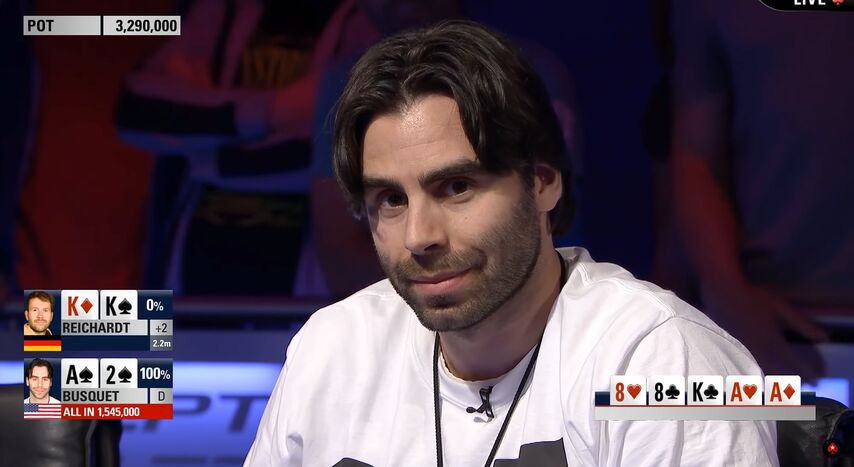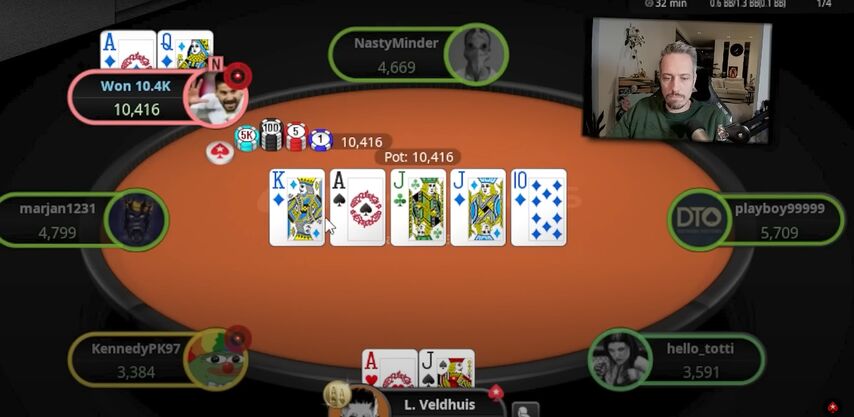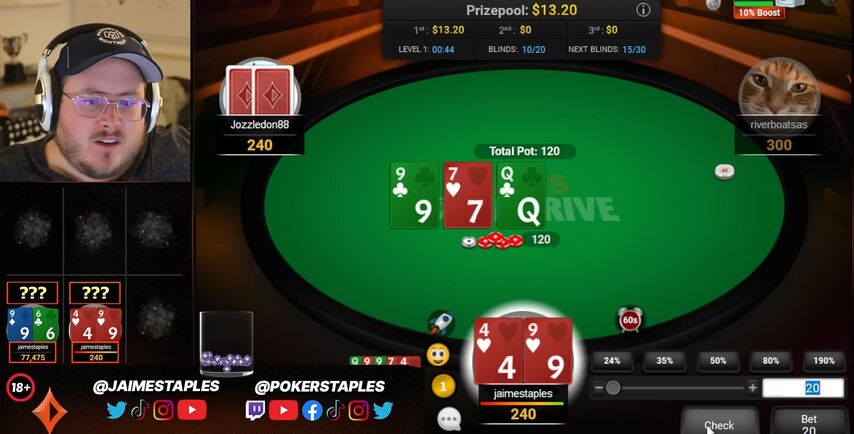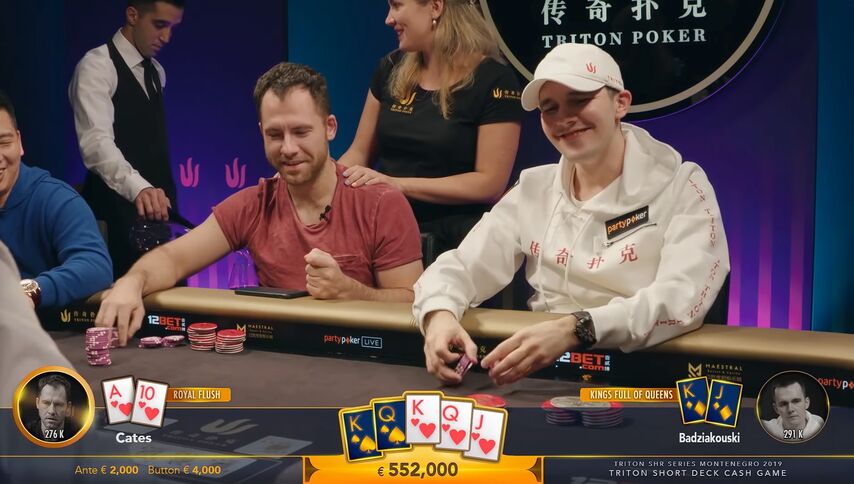What is runner runner in poker – also known as hitting a “backdoor” draw?
The meaning of runner runner is when a player goes from an underdog to an unlikely winner, only because specific cards come on the turn and river.
That’s the definition, but here’s an example:
You have 6♥ 7♥ and you’re all in against a player who has A♦ A♠. Your chances aren’t looking great preflop, but the flop comes 10♦ J♣ 3♦ – which doesn’t help your hand either.
The turn is an 8♣ and the river is a 9♥, giving you a runner runner straight to beat pocket Aces.

What Makes a Runner Runner Hand?
The definition of runner runner is a hand that is behind on the flop (in terms of equity %), but after specific turn and the river cards, it becomes a winning hand.
Another way of thinking about runner-runner hands is by understanding backdoor draws. The meaning of a backdoor draw is a draw that needs specific turn and river cards to be completed.
So if you have J♣ 10♣ on a flop of Q♣ 3♥ 5♠, there are a couple of different backdoor draws.
Can you think of some backdoor draws that J♣ 10♣ has on this flop?
Backdoor ♣ flush draw by getting runner-runner clubs.
For example, the turn is the 6♣ and the river is the A♣.
Backdoor straight draw by getting runner runner consecutive cards.
There are a few ways to do this, meaning a few different straights that J♣ 10♣ can create.
For example, the turn is a K♦ and the river is an A♥.
The turn could also be a 9♠ and then either a K♥ or an 8♠.
Backdoor three-of-a-kind.
It’s far more difficult to make runner-runner trips, since you only have 3 outs to hit, but it does happen.

You can feel the pain here as Lex Veldhuis goes from a full house in a PokerStars $1,000 satellite tournament – to losing to a runner-runner royal flush.
We all receive bad beats like this, but it goes both ways! Sometimes, you’ll be the one going runner runner on your poker foes. We can’t control that part, but we can at least be on a great poker site.
- Increased first deposit bonus
- Increased rakeback and reloads
- Help with deposits and cashouts
- Access to private freerolls
- Round-the-clock support
Do Runner Runner Hands Change Your Strategy?
We’ve gone over the meaning of runner runner poker hands, but how do they change your strategy?
Imagine that you have a backdoor draw (the chance to make a runner-runner hand).
With a backdoor flush draw, you can lean towards betting more with a non-made hand. If you were leading the betting preflop with an open raise and you find yourself on the flop with a backdoor flush draw (but not much else), then you can the aggressive strategy some of the time. If you pick up a flush draw on the turn, you’ll get a lot more equity.
With a backdoor straight draw, you don’t always pick up a ton of equity on those certain turn cards you need, but it’s still something to consider. Even if you pick up an open-ended straight draw on the turn, those 8 outs might not give you much of an equity boost. If you only have a gutshot straight draw on the turn, your equity will only go up by a few percent.
Backdoor straight and flush draws offer the best runner runner possibilities. 10 cards in the deck will give you a flush draw on the turn, plus several others that give you straight draws. These hands can be played more aggressively than hands where you don’t have backdoor straight and flush draws.
These backdoor draws can also make a big difference if calling and folding are a close decision.
When you make a runner runner hand, it’s going to be slightly harder for your opponents to believe – which often gets you some extra value on the river.
See how these backdoor draws affect your equity by using our free online odds calculator.

In a spot like this, Jamie is looking for some specific turn cards. Let’s say he is against a top pair hand like Q♠ 10♠. Against that kind of hand, he’s got about 22% equity with 4♥ 9♥, but the right turn cards can change that.
On the turn, hitting one of the remaining 9s or 4s would be ideal. With 5 cards that give Jamie two pair (9♠ 9♦ 4♠ 4♦ 4♣), he has 10% to make two pair on the turn, and 20% over the turn and river cards.
But if he sees a ♥ on the turn (other than the two cards that might give his opponent trips or two pair), he gets an equity boost.
Jamie Staples is a partypoker ambassador and his site is home to hourly $50-$200 freerolls, great cashback on rake, and extra-welcoming welcome bonuses (like $30 Freeplay).
3 Great Tips for Runner Runner Hands in Poker
1. Understand the hands you can make runner runner.
You should be able to instantly look at a flop and know what your backdoor hands are. When you identify them, you’ll understand which turn cards help you, and which ones are complete bricks.
2. Some runner-runner hands are better than others.
In terms of backdoor draws and making runner-runner hands, consider the value of your hand on the river. Making the nut flush is more valuable than making a 5-high flush and the same logic applies to straights. If you make the low end of the straight on the river, you might still be beaten by higher straights.
3. Try to play runner-runner spots in position.
When you play with backdoor draws in position, you have lots more options than playing them out of position. For example, you can choose to raise certain turn cards and get more value if you make a strong runner-runner hand on the river. Out of position, that’s trickier, especially in terms of getting value on the river.
























